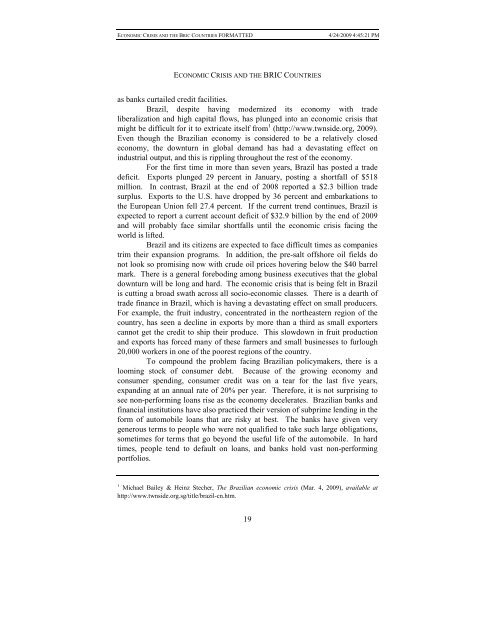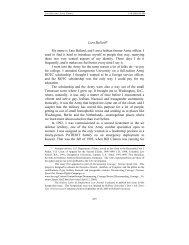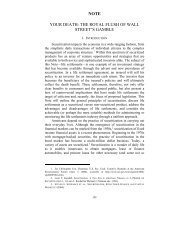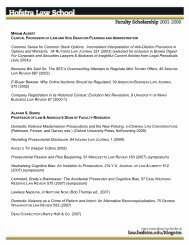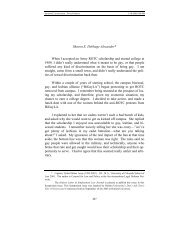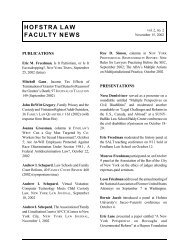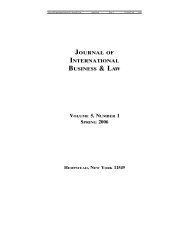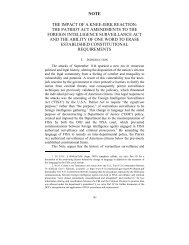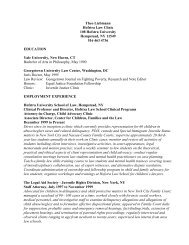JOURNAL OF INTERNATIONAL BUSINESS & LAW - Hofstra Law ...
JOURNAL OF INTERNATIONAL BUSINESS & LAW - Hofstra Law ...
JOURNAL OF INTERNATIONAL BUSINESS & LAW - Hofstra Law ...
You also want an ePaper? Increase the reach of your titles
YUMPU automatically turns print PDFs into web optimized ePapers that Google loves.
ECONOMIC CRISIS AND THE BRIC COUNTRIES FORMATTED4/24/2009 4:45:21 PMECONOMIC CRISIS AND THE BRIC COUNTRIESas banks curtailed credit facilities.Brazil, despite having modernized its economy with tradeliberalization and high capital flows, has plunged into an economic crisis thatmight be difficult for it to extricate itself from 1 (http://www.twnside.org, 2009).Even though the Brazilian economy is considered to be a relatively closedeconomy, the downturn in global demand has had a devastating effect onindustrial output, and this is rippling throughout the rest of the economy.For the first time in more than seven years, Brazil has posted a tradedeficit. Exports plunged 29 percent in January, posting a shortfall of $518million. In contrast, Brazil at the end of 2008 reported a $2.3 billion tradesurplus. Exports to the U.S. have dropped by 36 percent and embarkations tothe European Union fell 27.4 percent. If the current trend continues, Brazil isexpected to report a current account deficit of $32.9 billion by the end of 2009and will probably face similar shortfalls until the economic crisis facing theworld is lifted.Brazil and its citizens are expected to face difficult times as companiestrim their expansion programs. In addition, the pre-salt offshore oil fields donot look so promising now with crude oil prices hovering below the $40 barrelmark. There is a general foreboding among business executives that the globaldownturn will be long and hard. The economic crisis that is being felt in Brazilis cutting a broad swath across all socio-economic classes. There is a dearth oftrade finance in Brazil, which is having a devastating effect on small producers.For example, the fruit industry, concentrated in the northeastern region of thecountry, has seen a decline in exports by more than a third as small exporterscannot get the credit to ship their produce. This slowdown in fruit productionand exports has forced many of these farmers and small businesses to furlough20,000 workers in one of the poorest regions of the country.To compound the problem facing Brazilian policymakers, there is alooming stock of consumer debt. Because of the growing economy andconsumer spending, consumer credit was on a tear for the last five years,expanding at an annual rate of 20% per year. Therefore, it is not surprising tosee non-performing loans rise as the economy decelerates. Brazilian banks andfinancial institutions have also practiced their version of subprime lending in theform of automobile loans that are risky at best. The banks have given verygenerous terms to people who were not qualified to take such large obligations,sometimes for terms that go beyond the useful life of the automobile. In hardtimes, people tend to default on loans, and banks hold vast non-performingportfolios.1 Michael Bailey & Heinz Stecher, The Brazilian economic crisis (Mar. 4, 2009), available athttp://www.twnside.org.sg/title/brazil-cn.htm.19


